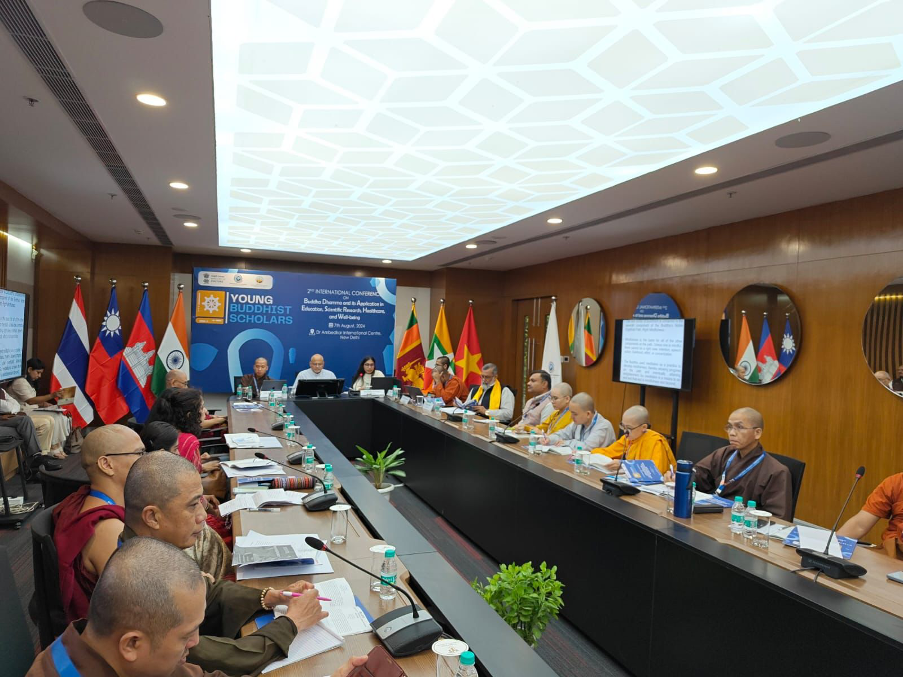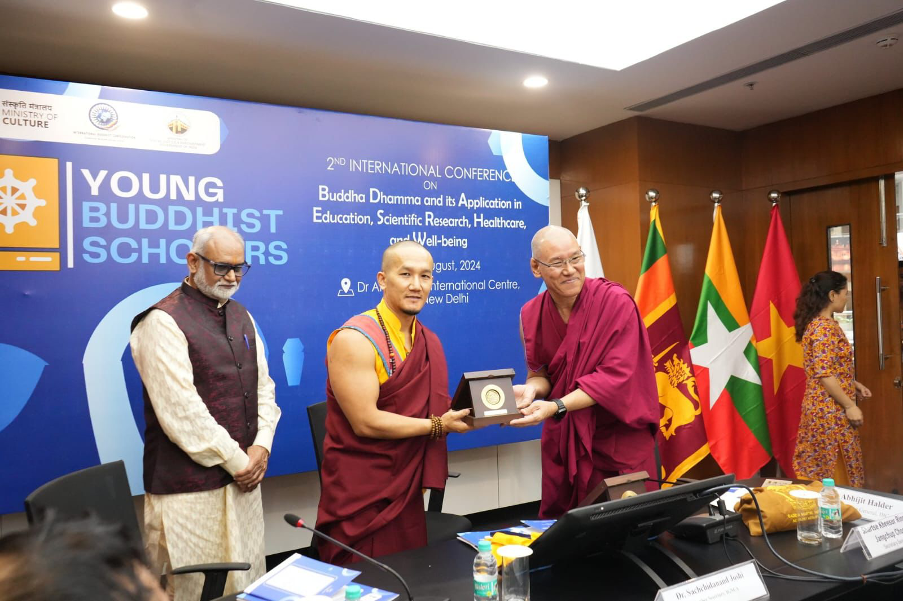By Tsering Namgyal Khortsa
The 2nd International Conference for Young Buddhist Scholars on Buddha Dhamma and its application in Education, Scientific Research, Healthcare, and Well-Being was held on 7 August 2024. It was organised by the International Buddhist Confederation (IBC), with support from the Indian government’s Ministry of Culture and the Ambedkar International Centre, under the Ministry of Social Justice and Empowerment.
The conference saw 15 papers presented by young academicians and researchers from seven countries, including India. It was also attended by members of the diplomatic community from Thailand, Bhutan, Cambodia and the Republic of Korea.
Dr. Sachchidanand Joshi, member secretary of Indira Gandhi National Centre for the Arts (IGNCA), was the chief guest. Denouncing the spread of religious fundamentalism the world over, Joshi said it had become a challenge to talk of compassion, kindness, peace, truth and harmony when the world was beset by destruction.
Speaking in New Delhi, Dr. Joshi questioned the direction the world was moving towards noting that any form of religious fundamentalism has no place in society. “We need to save the world with Dhamma, we are blessed to be in these times to shoulder this responsibility,” he said.
The Guest of Honour, H.E. the 8th Chokyong Palga Rinpoche from Ladakh, said that the Buddha Dhamma that had survived for 2,500 years now needed to evolve with the challenging times to remain relevant. Though it had spread from India, the Dhamma adapted to the local culture of the nations. He advised the young scholars to spread the message of the Buddha and the great masters of peace, harmony, and love in these troubled times.
The academic papers covered Buddha-dhamma and mental well-being, the application of Dhamma education in school, the Jataka Tales and their relevance, and the transformation of Cambodian society after years of destruction by the Khmer Rouge, among others.
In his welcome address, the Secretary General of IBC, Shartse Khensur Rinpoche Jangchup Choeden, said that universities should open departments focused on studying the links between Buddha-dhamma and science.

Supadcha Srisook, a PhD research scholar from Thailand, explained how in Thailand, there was a project from the Ministry of Education about the relationship between the house, temple, and school. The report discussed the importance of the connection between parents (house), religion (temple), and teachers (school), as well as how to cultivate students to have a good quality of life, both physically and mentally, for society.
In the process of this project, every school and high school (specific government schools must study the history of Buddha and Buddha Dhamma), undertook Buddhist activities and attend temples and Buddhist camps at least once a week. Students who participated in the Buddhist camp engaged in various activities, including prayer, study, and meditation, on top of practicing patience and getting involved in personal duties and responsibilities.
Ven. Morm Savonn, a PhD Research Scholar at Delhi University from Cambodia, mentioned that monks are highly valued members of the public. He noted that Buddhism has contributed significantly to Cambodia’s societal well-being and is a component of the social order’s development. The people and society of Cambodia place a high value on social well-being. Regretfully, he said that the Khmer Rouge ruined Cambodian society. Millions of people lost their lives in this civil war in Cambodia. Monks were murdered and made to lay down their lives, and other monasteries were destroyed. Buddhism was revived after the Khmer Rouge regime, and religion gradually started to grow again.
The primary objective of the conference was to create a vibrant platform for young researchers to share their insights, engage in scholarly pursuit, and contribute to the advancement of knowledge in the field. By facilitating interdisciplinary discussions, fostering collaboration, and promoting the exchange of knowledge, the conference aimed to contribute significantly to the advancement of scholarship in the field of Buddhist Studies and its integration, and impact on education, scientific research, healthcare, and well-being.
This integration offers a transformative potential for individuals and society. By fostering mindfulness, ethical conduct, compassion, and holistic health, these teachings can address contemporary challenges and enhance the quality of life. Implementing these principles requires a collaborative effort, interdisciplinary research, and a commitment to cultural sensitivity and sustainability. Through such efforts, the timeless wisdom of Buddha Dhamma can contribute significantly to the development of a more compassionate, healthy, and harmonious world.


